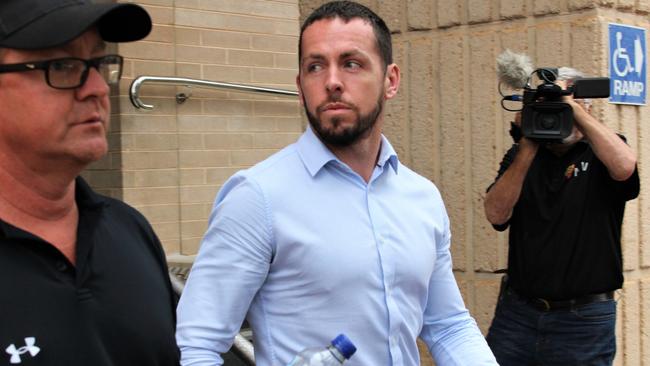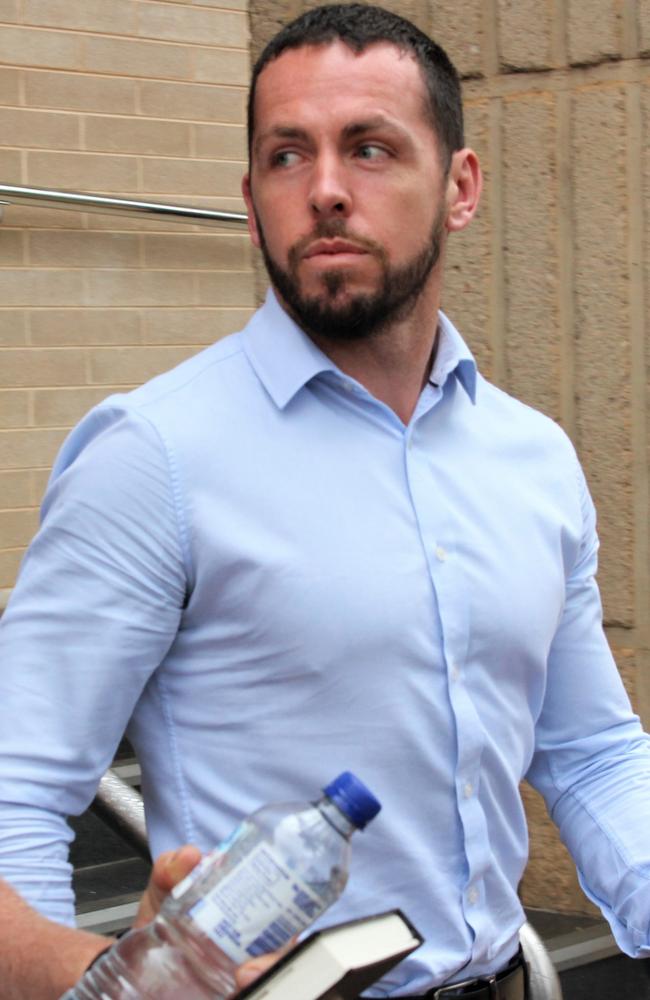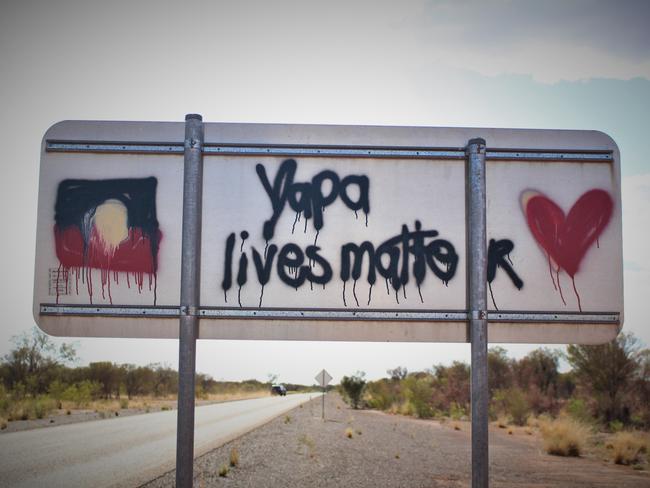Zach Rolfe refuses to answer questions about racist texts at Kumanjayi Walker inquest
Zach Rolfe has told a court his answers to questions about racist slurs he used in text messages with other officers could leave him in hot water with NT Police.

Police & Courts
Don't miss out on the headlines from Police & Courts. Followed categories will be added to My News.
Zach Rolfe has been excused from giving evidence about the night he killed Kumanjayi Walker after a Coroner ruled his answers could expose him to disciplinary action.
Constable Rolfe on Wednesday briefly gave evidence at the inquest into Mr Walker’s death after he shot him three times during a bungled arrest in Yuendumu in 2019 and was acquitted on all charges over the shooting in March.
After hearing submissions from his lawyer, Territory Coroner Elisabeth Armitage ruled she was satisfied that forcing Constable Rolfe to continue giving evidence might expose him to disciplinary action by NT Police.
The Supreme Court is due to hear arguments about whether and how the “penalty privilege” applies in Coronial proceedings on Tuesday and Ms Armitage said she would defer any further consideration until after the higher court made its ruling.
Constable Rolfe was excused from giving evidence but will have to return to the witness box once the legal issues are resolved at a date to be fixed.
Earlier, Constable Rolfe refused to answer questions about racist text messages downloaded from his phone or allegations of excessive force on the basis that he might face internal police disciplinary proceedings as result.
After taking the stand, Constable Rolfe told counsel assisting the Coroner, Peggy Dwyer, he had “been banned from all police stations” since returning to work in July following his acquittal on all charges over the shooting.
He also told Dr Dwyer that while he had received cultural training at the police academy, he had not “found a specific use for that in the job”.
“I’m responding to human problems of humans asking for help and then humans breaking the law,” he said.
“As a police officer, I’m responding to a job where someone is calling for help or someone has broken the law, I am not being called to a cultural issue.”
Dr Dwyer asked: “Do you say that you received no training in terms of cultural awareness that assisted you in that job?”
“No, I’m saying we received cultural training but look, again, I haven’t responded to cultural clashes in the job,” Constable Rolfe replied.
“I haven’t come up with so much of a cultural clash as a police officer, I’ve come up with a behavioural clash among humans.”
Constable Rolfe said he believed he should “show respect for an Aboriginal person in the same way as a non-Aboriginal person”.
But when Dr Dwyer read to him from a text message in which he referred to Aboriginal people as “c**ns”, he told her he would not answer any questions about the messages.
“Do you agree, Constable Rolfe, that the content of that message is obviously racist?” she asked.

“I wish to exercise my right and claim penalty privilege on the basis my answers might tend to expose me to a penalty,” he responded.
Under further questioning, Constable Rolfe said his response to any questions about the “use or misuse of body-worn camera footage” or the use of force would be the same.
Barrister for NT Police, Ian Freckelton KC, told the court only one use of force incident and three other disciplinary proceedings relating to material downloaded from Constable Rolfe’s phone remained ongoing.
Dr Freckelton said the text messages were still the subject of a potential legal challenge and a disciplinary hearing relating to them had been adjourned until next month.
He said all other complaints about Constable Rolfe’s conduct while on the job had been resolved, including through “remedial advice”, which he said “consists of an assertive conversation by a senior police officer”.
“(That’s) to provide guidance and mentoring to them in respect of the way in which they conduct themselves,” he said.
“It’s not a formal disciplinary outcome, but it’s intended to provide assistance to them so if something has been identified which is inappropriate in the way that they have conducted themselves, they can be guided to do better.”
But Dr Freckelton said there were “some associated matters which are still ongoing” relating to the events of the day of the fatal shooting.
“It would be inappropriate for me to go into details in respect of those at this stage,” he said.
“However, your honour will note that the period of time limitation applies in respect of such matters so there are major limitations in terms of anything that can be done in respect of (those).

“It is an issue that we will raise with you in due course, in our submissions, about the legislative restraints which inhibit the capacity of the NT Police force to deal with incidents in a disciplinary sense in many contexts.”
In support of Constable Rolfe’s claim of privilege, his lawyer, Luke Officer, said any assurances that matters had been finalised was no guarantee they would not be reopened.
“Constable Rolfe doesn’t need to demonstrate that there is in fact actual proceedings, although in this case we know there are some, nor does he need to demonstrate that proceedings are likely,” he said.
“It is actually or otherwise potential exposure to disciplinary proceedings which could amount to a penalty.”
Mr Officer said time limitations on the bringing of disciplinary proceedings in the Police Administration Act only began once the alleged breach was discovered, rather than from the date of the incident.
“It can be the evidence from one’s own mouth in the course of a Coronial investigation which might give rise to a new date of discovery for an act or omission or an impugned conduct,” he said.
“It could be, your honour, your findings with respect of certain activities, with respect of certain conduct undertaken by a member in the course of matters which you have indicated you will investigate.”
The inquest continues.


